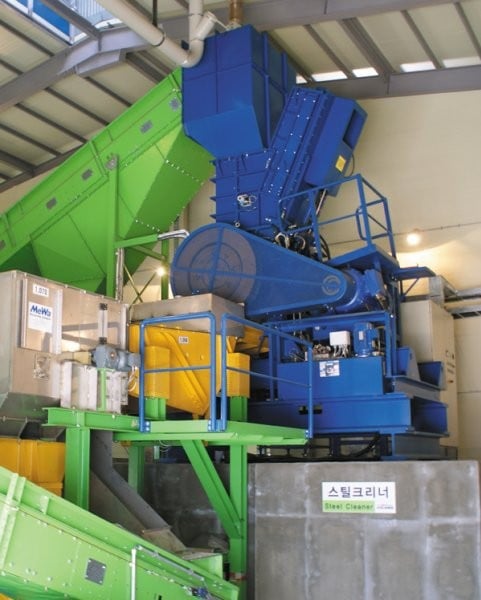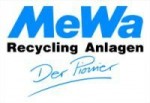Cleaning up on tire shredding
South Korean rubber recycler is first outside Europe to use innovative tire wire cleaner that achieves extremely high purity

From the recycling of used tires to the recycling of news ones, Anothen WTE (waste to energy) is a South Korea-based company involved in the entire raw rubber material cycle.
In January, 2011, German recycling equipment specialist, MeWa Recycling Maschinen und Anlagenbau GmbH, installed a new recycling line at Anothen’s site in Geumsan, South Korea. According to MeWa, this is the first time their system has been installed outside of Europe, and is the first in Asia where a system incorporates a process that can recycle all the steel cord from tire beads to a very high quality standard.
The challenges faced
Upon arrival at Anothen’s Geumsan site, used tires are first pre-shredded. They are then fed into a MeWa UG 1600 granulator, which grinds up approximately two tonnes of shredded tires per hour into granules less than 20mm in size. Anothen WTE then feeds most of the granulated rubber directly into a pyrolysis plant which produces carbon black, oil and gas. These fuels are used to produce process steam that is delivered to a neighbouring production plant owned by Anothen’s partner company, which produces moulding bladders. These flexible bladders are then sold for use in the vulcanization process of an international tire manufacturer, also located in South Korea.
Because approximately ten to twenty percent of the weight of a used car tire is made up of steel, in the form of wire cord embedded in the bead of the tire, it cannot be processed by pyrolysis. For this fraction of the ground tire material, Anothen uses a magnet above a conveyor belt to remove the steel cord as it is conveyed from the granulator.
At this point, the steel is in a very “impure” condition. Between 10 and 35 percent of its weight is still made up of rubber and fabric adhering to the wire cord. Suitable neither for pyrolysis nor for recycling at a steelworks, this mixture of materials had, until recently, represented an unsolved problem for Anothen WTE.
The solution
Anothen WTE first brought their challenge to the attention of MeWa at a 2009 trade show. At the time they were specifically looking for tire recycling equipment that would clean their steel wire fraction. MeWa, at that time, was finishing up the development of their tire wire cleaner technology. According to MeWa, they have been focused since 2008, on tackling the problem of contaminated steel cord. Their work resulted in the UNI-CUT SP tire wire cleaner, a special machine capable of almost completely separating rubber residues from steel wires.
MeWa’s tire wire cleaner uses a combination of shear and pressing forces to break up the material compound. It combines the advantages of a low-wear mill with the dynamic properties of a granulator, but without using delicate blades. The machine strips the rubber off of steel cord using tools mounted on a rotor shaft which rub the rubber and steel mixture on the stator shaft of the machine against one another, thus separating out the individual fractions.
The machine is offered as a complete process solution with feed and extraction conveying as well as connected separation technology. Specially configured vibration channels and magnets separate the exposed wire, textile and rubber fractions, and the entire separation plant is encapsulated. This enables exposed textiles to be blown out via air separation devices and captured in a filter. The turnkey MeWa line is also equipped with its own control system and is configured for a throughput of around 1 metric tonne per hour.
According to MeWa, at the end, the wire emerges with an extremely high purity, and the leftover rubber can be returned to the tire processing line, where in additional steps the remaining textile residues are removed and the rubber is processed to create a granulate or fine rubber powder. For Anothen, to be able to maintain operation of their plant at full capacity, they have been buying steel cord waste from other tire recycling plants in South Korea. In the end, their wire is emerging with a purity of greater than 98 percent, and is high enough in quality that it can be used in steel melt shops.


